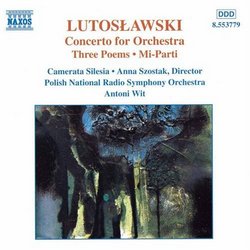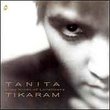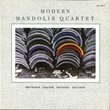| All Artists: Witold Lutoslawski, Antoni Wit, Camerata Polifonica Siciliana, Polish Radio Orchestra & Chorus Katowice, Polish Radio and Television National Symphony Orchestra Title: Lutoslawski: Concerto for Orchestra; Three Poems; Mi-Parti Members Wishing: 0 Total Copies: 1 Label: Naxos Release Date: 12/1/1998 Genre: Classical Styles: Opera & Classical Vocal, Forms & Genres, Concertos, Theatrical, Incidental & Program Music, Historical Periods, Modern, 20th, & 21st Century, Symphonies Number of Discs: 1 SwapaCD Credits: 1 UPC: 730099477925 |
Search - Witold Lutoslawski, Antoni Wit, Camerata Polifonica Siciliana :: Lutoslawski: Concerto for Orchestra; Three Poems; Mi-Parti
 | Witold Lutoslawski, Antoni Wit, Camerata Polifonica Siciliana Lutoslawski: Concerto for Orchestra; Three Poems; Mi-Parti Genre: Classical
![header=[] body=[This CD is available to be requested as disc only.]](/images/attributes/disc.png?v=15401716) ![header=[] body=[This CD is available to be requested with the disc and back insert.]](/images/attributes/disc_back.png?v=15401716) ![header=[] body=[This CD is available to be requested with the disc and front insert.]](/images/attributes/disc_front.png?v=15401716) ![header=[] body=[This CD is available to be requested with the disc, front and back inserts.]](/images/attributes/disc_front_back.png?v=15401716) |
Larger Image |
CD DetailsSimilar CDs
Similarly Requested CDs
|
CD ReviewsAmazing works Sungu Okan | Istanbul, Istanbul Turkey | 08/11/2004 (5 out of 5 stars) "This is a good recording for begginers to Lutoslawski and already-know-Lutoslawski admirers. Antoni Wit is a champion on perform the musics of Lutoslawski and Penderecki (even so Mahler too, released on Naxos). There is a Bartokian and modal Overture, also it is a succesful early-work with his 1st Symphony. Concerto for Orchestra is already known and his more modernist and most famous work. But, I think that, the star of this CD is Three poems of Henri Michaux. I supose, this is the most pshycopat choral work of 20th century. Even so, this work won 1st prize in a competition of UNESCO. The poems are French (libretto including with Eng. translation) and the using of chorus are extraordinary. I like especially the second movement, Le Grand Combat. This is very terrific, wild and impressive. Highly recommended." A good recording of 'Concerto', and the best 'Mi-Parti' avai JohnWYC | Hong Kong | 05/26/2007 (5 out of 5 stars) "We must thank Naxos and Wit for their committed efforts in recording 20th century Polish music, especially of their continuing series of Lutoslawski's complete orchestral works. Lutoslawski is one of the most innovative composers of the mid-late 20th century, and the recording here (as in other volumes) brings together works from both Lutoslawski's earlier, folk-inspired era (Concerto and Overture) and the latter, semi-aleatoric era (Poems and Mi-Parti). 'Concerto for Orchestra' is famous enough, so I won't go into details here, but I would certainly have liked more crisper, precise rhythms in the 1st movement. The Camerata Silesia demonstrate full confidence in the semi-aleatoric processes going on in the 'Three Poems', based on Michaux's surrealist poetry. Lutoslawski's new style was gradually taking form, and so this work is rather experimental in nature, paving way for the coming vocal masterpieces 'Paroles tissees' and 'Les Espaces du Sommeil'. His semi-aleatoric style is well suited to the hissing and shouting required by the text in 'Le Grand Combat'. This is great fun to listen to. The last poem of the work, 'Repos dans le malheur', an ultra-condensed requiem in a sense, is hauntingly beautiful. (There is a misprint on the CD. 'Repos' should be track 6, while 'Combat' should be track 5.) 'Mi-Parti' is one of my favourite Lutoslawski works. Although written in the seventies, its long, beautiful catilenas predate the composer's Symphony No. 4 and 'Les Espaces du Sommeil' in the coming decade or so (they are recorded on vol. 1 and vol. 3 respectively). There are lush string sonorities, with flute bird-calls above, and the piece gradually builds up to a climax, followed by a wistful coda (played by strings) ascending into heaven. Indeed, 'Mi-Parti' would've served well as a short symphony. Analyzing on a more academic aspect, Lutoslawski employs 'vertical/harmonic serialism' here (as opposed to Schoenbergian horizontal/melodic serialism'). Chords are built using all 12 notes of the chromatic scale, yet Lutoslawski spaces the notes widely, so that the harmonies sound amazingly consonant, even neo-romantic, especially by the use of major and minor thirds/sixths. The two-part structure (as implied by the title) is a signature of Lutoslawski's later works (Symphonies Nos 2, 3, and 4). 'Overture for Strings' brings us back to the composer's earlier neo-classical era. A harmless little piece with quirky harmonies that make one smile. The sound, though not the best in the series, is more than good. I would've liked a clearer bass though. This is a good introduction to Lutoslawski's music, and at Naxos' price, you can't just sit here wondering. Go give this a try, especially for 'Mi-Parti', it might open the door to contemporary classical music for you." 5 stars for half the disc Perry Townsend | New York, NY USA | 11/20/2006 (5 out of 5 stars) "That would be, the mature half ("Mi-Parti and "Trois Poemes"). The Concerto is good but not remarkable or terribly inventive, and the Overture is practically juvenilia. However, despite another reviewer's assertion, I'd argue that indeed Lutoslawski "found himself" in the modernist works of the 60s through 90s, starting with "Trois Poemes". If his career had ended before this point, he would be considered a very fine & skilled composer indeed, but not one who forever changed the contour of the language. These works and others from his mature period are central to 20th century repertoire.
The performances of both works are very strong, esp. the "Mi-Parti" which is exquisite. I agree Luto's own recording of "Trois Poemes" is more laser-beamed and on the money, though Wit's is certainly fine. This disc is well worth buying for these 2 works alone, even though the other 2 are largely ignorable. One note: The disc packaging gets the movement order wrong in "Trois Poemes". "Le Grand Combat" is the crazy, babbling, screaming middle movement (hence the title), and "Repos daus le malheur" is the hauntingly elegiac finale." |

 Track Listings (8) - Disc #1
Track Listings (8) - Disc #1










